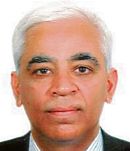
Each one counts: All efforts should be directed toward saving maximum lives.
Sanjiv Arora
Sanjiv Arora
Former Secretary, Ministry of External Affairs
As the world continues to grapple with the unprecedented crisis caused by Covid-19, strategic experts have been engaged in debating the geopolitical implications of this pandemic that has already infected over 1.28 million people and claimed around 70,000 lives. The themes on which think tanks, academics, former diplomats, etc, have been in top gear with their analyses, judgements and forecasts include, most notably, the systems of governance in different countries affected by the pandemic, successes and failures of leadership, and the way the global power calculus would play out in the years ahead, based on the responses of nation-states to the pandemic and its economic, social, security and strategic implications.
All these are important issues, but there are serious problems, both with the timing as well as the approach, in many cases, of this exercise being undertaken when the world is fighting a common and invisible enemy.
Looking at the versatile and vibrant strategic community in our own country and their fraternity in other parts of the world, one gets an impression that their analyses of how countries have, and are dealing with Covid are often aimed at trumpeting their predilections and favourite hypotheses. Many of them are using their strategic discourse to denigrate countries, be it China, the US, Italy, Spain or the UK; to proclaim the ‘victorious’ and the ‘vanquished’; to make sweeping judgements about one system of governance having outsmarted another; to engage in frenzied criticism of some governments and obsequious adulation of others, instead of giving objective feedback and counsel on the pros and cons of the policies and strategies adopted by different countries; and to write obituaries of globalisation or multilateralism or both!
One gets an impression that for many strategic experts, Covid is already shaping the contours of a new geopolitical landscape. For example, in his commentary on how countries are confronting this pandemic, a well-known academic and author has portrayed the responses in an East vs West construct and concluded that Asian democracies are performing much better than their western counterparts, for reasons which include cultural and sociological contrasts such as greater emphasis on individual freedoms in the West. Another writer, one of India’s foremost China experts, seems to be projecting a decline in China’s influence in the post-Covid world order, and almost drawing a direct correlation between how India deals with this pandemic and its role in the international arena in the years ahead. There are many other arguments being pushed in support of different forecasts after this pandemic has been contained.
Amidst this barrage of views from the strategic community, they may wish to step back and reflect on the tools of their analyses, as also on the outcomes projected by them. They may also ask themselves if this is the time for geopolitical debates. This suggestion is driven not by any gratuitous idealism, but by realpolitik. Besides the enormous and incessant efforts that every country needs to exert, initiatives at bilateral, regional and multilateral levels to share information, expertise, research and development and innovation in critical areas, including masks and PPE; kits for accelerated testing; hospital beds, isolation wards, respirators and ICUs; clean water, sanitation and public health; last-mile connectivity with mass communication; and safe and swift logistics and supply chains, are more important than at any other time in recent history.
Further, it would be in the collective interest of the international community to give impetus to joint initiatives, as has been demonstrated by the setting up of an emergency fund by SAARC countries, in pursuance of a video conference at the invitation of PM Modi and the convening of a virtual G20 summit. While the tangible contributions on the table through such engagement would be modest in the situation of overstretched domestic resources, multilateral initiatives would need to be strengthened when the global curve of Covid starts flattening. Even as countries will get increasingly preoccupied with the huge task of reviving their economies, collaborative mechanisms in critical areas related to public health and medicare, as also in the economic, financial and social spheres, would be in collective interest. The philosophy of Vasudhaiva Kutumbakam is rooted as much in realism as it is in idealism.
A rewind of the concerns expressed by some experts shows that Covid is not exactly a ‘black swan’ event for humanity as there were forewarnings necessitating urgent long-term planning and strategies — a precise articulation, shorn of jargon, being by Bill Gates in ‘Ted Talk’ in 2015 in the aftermath of the Ebola epidemic. It would thus be incumbent upon the international community to ensure that history does not repeat itself.
This is not to undermine the importance of brainstorming during the war against Covid. However, this discussion would be much more productive if it is aimed at augmenting individual and collective expertise and resources, and devising swifter and more effective strategies to fight a global threat than to indulge in armchair intellectualism, sweeping generalisations or games of one-upmanship.
India and the rest of the world are at war with a common enemy, and what is most important is to save every human life. This is the time for action by everyone. Debates can wait until the enemy has been defeated.
Views are personal
Join Whatsapp Channel of The Tribune for latest updates.




























